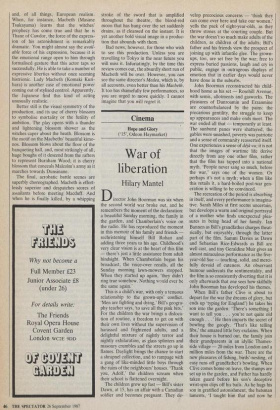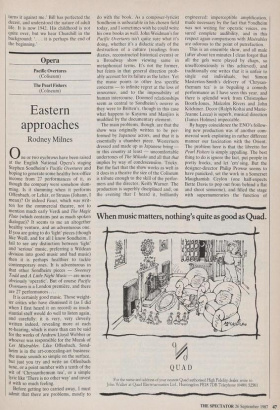Cinema
Hope and Glory (15', Odeon Haymarket)
War of liberation
Hilary Mantel Director John Boorman was six when the second world war broke out, and he remembers the moment of the declaration: a beautiful Sunday morning, the family in the garden, and Chamberlain's voice on the radio. He has reproduced the moment in this memoir of his family and friends rechristening himself Bill Rohan and adding three years to his age. Childhood's very clear vision is at the heart of this film — there's just a little assistance from adult hindsight. When Chamberlain began his broadcast, the voice-over recalls, all the Sunday morning lawn-mowers stopped. When they started up again, 'they didn't ring true somehow. Nothing would ever be the same again.'
This is a child's war, with only a tenuous relationship to the grown-ups' conflict. `Men are fighting and dying,' Bill's geogra- phy teacher says, 'to save all the pink bits.' For the children the war brings a disloca- tion of routine, a freedom to get on with their own lives without the supervision of harassed and frightened adults, and a delightful mixture of nightly terror and nightly exhilaration, as glass splinters and masonry crumbles and the streets go up in flames. Daylight brings the chance to start a shrapnel collection, and to rampage with a gang of like-minded little boys through the ruins of the neighbours' houses. 'Thank you, Adolf,' the children scream when their school is flattened overnight.
The children grow up fast — Bill's sister Dawn, at 15, has an affair with a Canadian soldier and becomes pregnant. They de- velop precocious concerns — 'think they can come over here and take our women,' yells the pack of eight-year-olds, as they throw stones at the courting couple. But the war doesn't so much make adults of the children, as children of the adults; Bill's father and his friends view the prospect of joining up with infantile glee. The grown- ups, too, are set free by the war; free to express buried passions, laugh and cry in public, engage in outrageous displays of emotion that in earlier days would never have done in the suburbs.
John Boorman reconstructed his child- hood home as his .set — Rosehill Avenue, with semis, allotments and gasworks. The pleasures of Dunroamin and Erzanmine are counterbalanced by the pains: the precarious gentility, the struggle to keep up appearances and make ends meet. The war ended all that — temporarily at least. The sunburst panes were shattered, the gables were smashed, poverty was patriotic and a sense of community reasserted itself. One experiences a sense of déjà vu; it is not that the images of wartime life derive directly from any one other film, rather that the film has tapped into a national myth. 'People never sang so much, before the war,' says one of the women. Or perhaps it's not a myth; when a film like this retails it, a hard-boiled post-war gen- eration is willing to be convinced.
The recreation of the period is absorbing in itself, and every performance is imagina- tive. Sarah Miles at first seems uncertain, but develops a warm and original portrayal of a mother who finds unexpected plea- sures in being head of her family. Ian Bannen as Bill's grandfather charges theat- rically, but enjoyably, through the latter part of the film. Sammi Davies as Dawn and Sebastian Rice-Edwards as Bill are well cast, and tiny Geraldine Muir gives an almost miraculous performance as the five- year-old Sue — touching, solid, and merci- fully devoid of cuteness. An observant humour undercuts the sentimentality, and the film is so consistently diverting that it is only afterwards that one sees how skilfully John Boorman has developed his themes.
When Bill's father Clive is about to depart for the war (he dreams of glory, but ends up 'typing for England') he takes his son into the garden: 'There's something I want to tell you . . . you're not quite old enough . . .' He then imparts the secret of bowling the googly. 'That's like telling fibs,' the amazed little boy exclaims. When their house is burned out, the family join their grandparents in an idyllic Thames- side village — 20 miles from London and a million miles from the war. There are the new pleasures of fishing, birds'-nesting, of easy runs off grandfather's bowling. When Clive comes home on leave, the stumps are set up in the garden, and Father has hardly taken guard before his son's deceptive wrist-spin clips off his bails. As he hugs his son in gratified astonishment, the batsman laments, 'I taught him that and now he turns it against me.' Bill has perfected the deceit, and understood the nature of adult life. It is now 1942. His childhood is not quite over, but we hear Churchill in the background: `. . . it is perhaps the end of the beginning.'































































 Previous page
Previous page